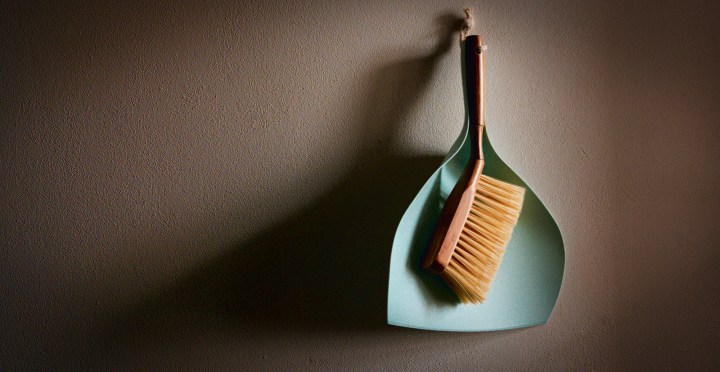STRESS-BUSTING OPED
A clean break – how washing up or making your bed can be a first step towards mental health

Organising or tidying your home or workspace is a way of creating order in chaos and helps ward off extra stress. And the good news is you can start by ensuring you accomplish small tasks.
Unfinished business. It might be yesterday or even two decades ago, but this theme has become an umbrella term for many an unresolved matter. Enlightened sexism, the death of a loved one and difficult endings to romantic relationships are all examples of situations where your mind stubs its metaphorical toe, triggering relatively strong emotions.
Researchers in the field of psychiatry have found that, to the human brain, chaos in a living space or workspace also represents unfinished business. Whether it’s something as innocuous as an empty coffee cup on a bedside table or an extremely untidy desk after a day’s work, our visual cortex becomes overwhelmed by objects not related to what it needs to focus on and, to varying degrees, disarray can set off the exact same response in people who are already stressed, adding another layer to a severely strained cognitive system.
Cleaning to de-escalate
I stumbled on the notion of “cleaning to de-escalate” just over a year ago, and yet it’s a coping mechanism I’ve been employing for nearly a decade. When we feel overwhelmed or stressed out, we may try having a drink, doing yoga or going for a run. Other people might go straight to bed after a day’s work, set daily reminders to practise mindfulness or go for a massage. And then there are people who – like me – might wipe down the entire kitchen and rake up the autumn debris before the day actually starts.
American psychiatrist Gregory Scott Brown contends that cleaning can be a type of meditative experience. Says Brown: “Mindfulness is all about conscious awareness. Tuning out the stress of the outside world and bringing your awareness to the task at hand by focusing on accomplishing just that one thing in the moment may actually be advantageous for your mental health.”
In The Miracle of Mindfulness, the Vietnamese monk Thich Nhat Hanh describes the act of washing a dish as a “wondrous reality”. With the washing of each item, he seeks the possibility of simply letting go and being in that moment: “I am completely myself, following my breath, conscious of my presence and my thoughts and actions. Right now, there’s no way I can be tossed around mindlessly.”
Processing existing complexities
Whether I’m loading the dishwasher or washing three plates, I often find that I’m able to centre my entire being on just that one task. Nothing can overwhelm me while I am doing this (very prosaic) thing. Gardening as a way of processing my thoughts is one other task I’ve started liking in recent years. Being outside and tending to living plants while shuttling to and fro warrants its own article, but the principles are quite similar. For example, while processing a work complexity, I might look at my garden and see that the orange trumpet creeper is completely taking over the bay tree. I’ll then try to figure out how I’m going to ensure that both are able to come into their own in this tiny ecosystem on my property.
For many people, these acts of cleaning can be a kind of sweet spot. A rigorous bit of scrubbing or sweeping is bound to release some endorphins – a type of neurotransmitter that attaches itself to the brain’s opioid receptors and carries signals across the entire nervous system (a bit like a few Takealot couriers hopping on a complex metro system to deliver boxes of goodies to your whole body).
In addition, we tend to derive quite a bit of satisfaction from having decluttered a space, primarily because the act of “sorting things out” helps us gain a sense of control and personal mastery over our immediate environment.
Start by making your bed
There is also something to be said for the kind of depression that makes the thought of getting out of bed (let alone sweeping a floor) difficult.
Psychologists have argued that disorder in your immediate space is directly linked to negative emotions like tension and irritability, thus reinforcing the sadness you’re already feeling. If you’re having one of those days, it could be useful to practise a rudimentary form of what the American political scientist Charles Lindblom called incrementalism.
Visit Daily Maverick’s home page for more news, analysis and investigations
Put simply, the theory holds that a focus on incremental changes as opposed to large leaps can lay the foundation for bigger change over time. In fact, because it’s so intuitive, most of us employ incrementalism without ever really thinking about it. In his book Make Your Bed: Little Things that Can Change Your Life… And Maybe the World, retired US Navy SEAL Admiral William McRaven advocates for the idea of starting small as a means to effect eventual paradigm shifts. So, if the only thing you can get yourself to do on any given day is get out of, and make, your bed, it’s a good start.
Read in Daily Maverick:
“Get wise to the words – it’s time to mind our language around those living with mental illness”
“What happens when you stop paying the price of social media”
The cleaning wife (partner or mother) when she is angry or stressed has become a bit of a trope. In a way, we’ve been socialised to see how doing something manageable can help when too much unfinished business has shoved its way into our lives.
On my own life journey thus far, I’ve found that it is possible to process near-debilitating sources of stress by tossing all the clothes in my house on the floor to sort them out, piece by piece. I make time for these mundane tasks not only because it has to be done from time to time, but also because I’ve grasped that without it I might well not have found my way out of bed in the first place. DM168
Florence de Vries is a communications specialist and journalist whose primary research interests are in the fields of mental health and the ethics of care.
This story first appeared in our weekly Daily Maverick 168 newspaper, which is available countrywide for R25.




















on this concept, domestic workers must be very content people
Excellent advice!